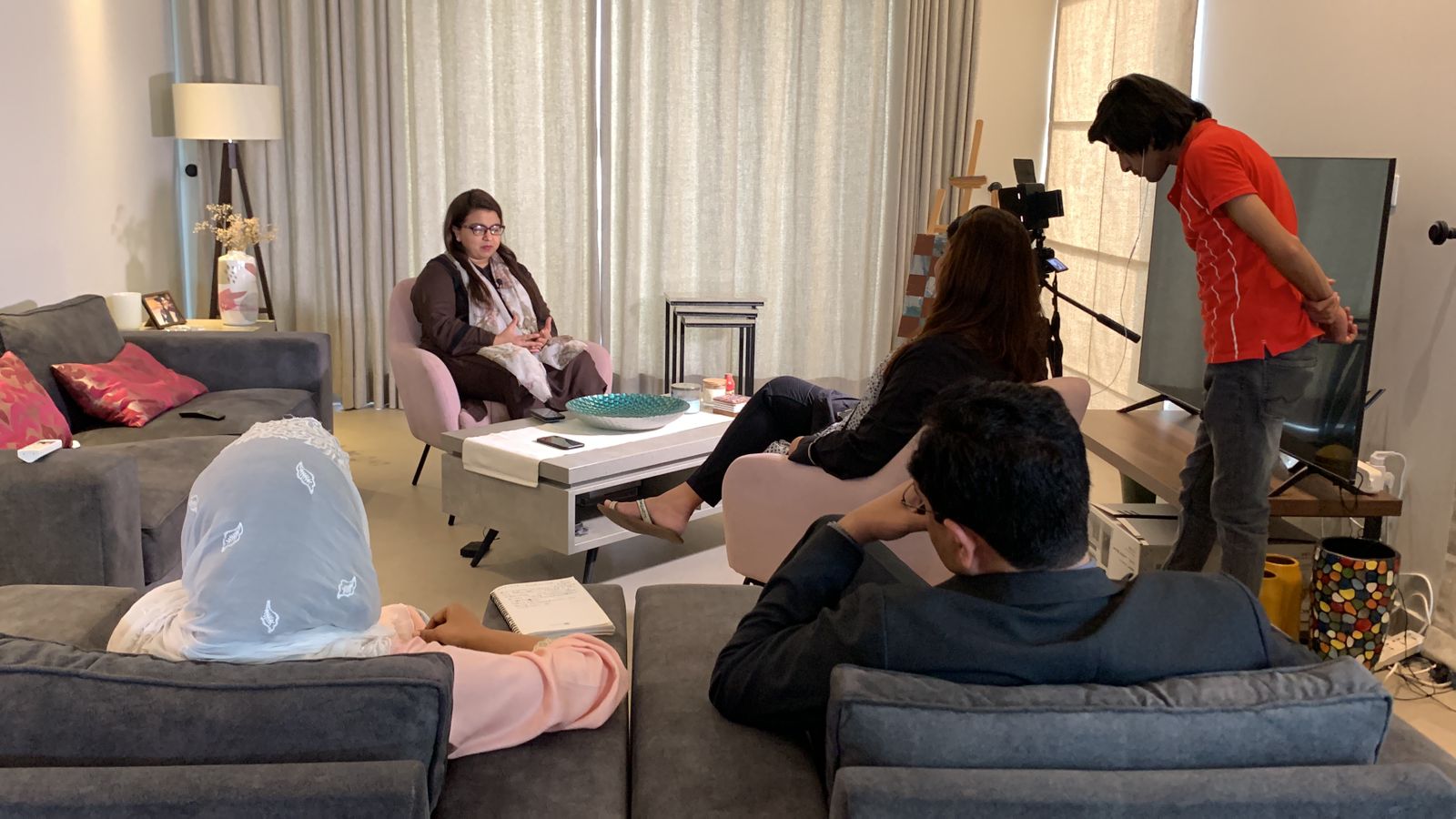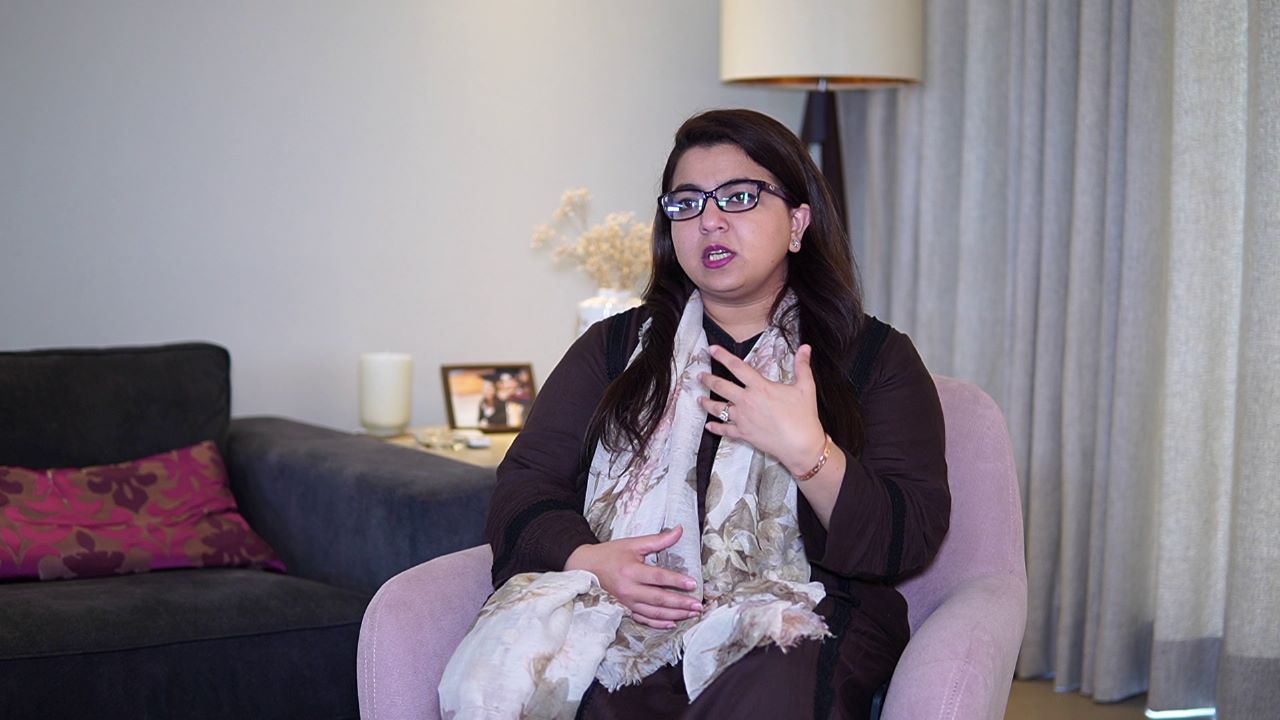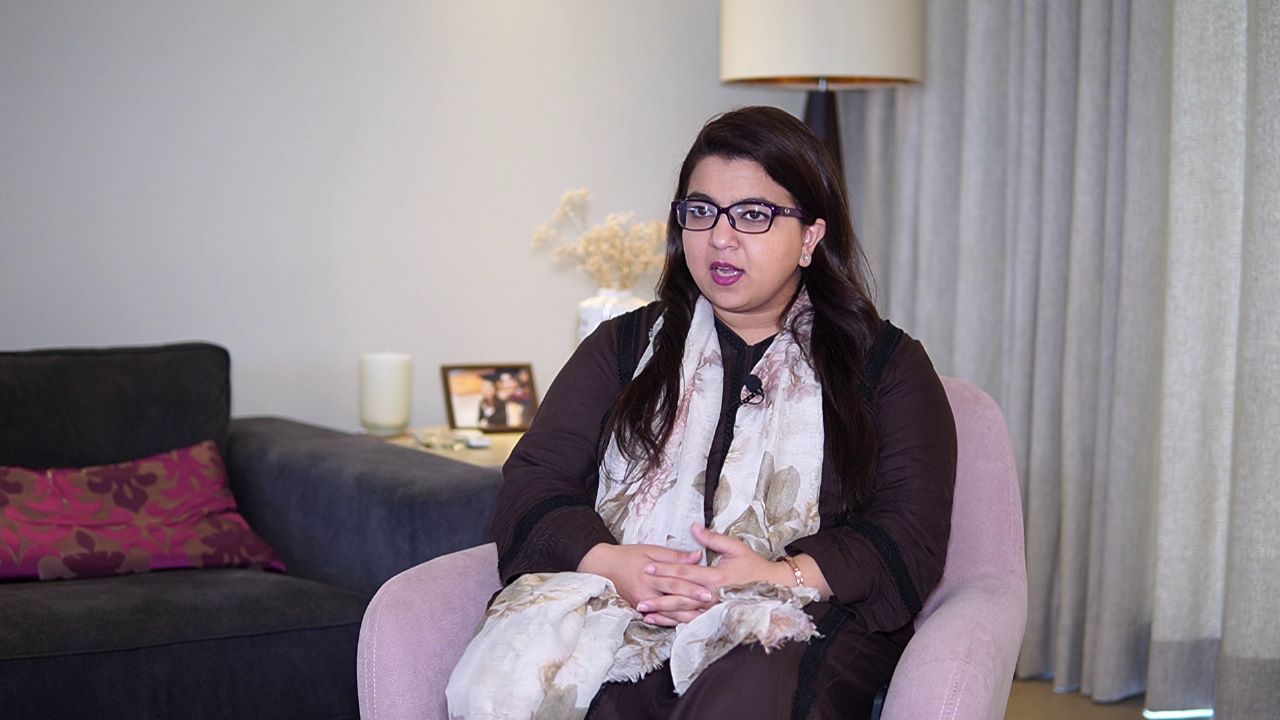When Shaza Fatima Khawaja was nominated for a reserved seat for women in Pakistan’s National Assembly in 2013 by PML-N, she was barely 25 years old and looked several years younger than her age. At the time, she was the youngest parliamentarian in Pakistan. She was again nominated in 2018 and came to the National Assembly as a member. Since then, she has done remarkable work and proved her mettle as a young, educated female legislator. Currently, she is serving as special assistant to prime minister (SAPM) on youth affairs, and chief coordinator of the Prime Minister’s Youth Skill Development Programme. Horizon sat down with her to learn about her political journey and achievements.

Horizon: Thank you very much for taking time out of your busy schedule and inviting us to your place for this interview.
Shaza Fatima Khawaja: The pleasure is all mine.
Horizon: So, for our readers, we want to know who is Shaza Fatima Khawaja.
SFK: I was born in Murree. My father, Khawaja Muhammad Naeem was posted there as assistant commissioner. I am the only sister to two brothers. I started my schooling at Convent Sahiwal and in 1992 when we shifted to Lahore, I did my O level from Beaconhouse School and A Level from Lahore Grammar School. I did my undergraduate in economics and politics from Lahore University of Management Sciences. Then I went on to do my master’s in international relations from the University of Warwick, UK.
After coming back to Pakistan, I started my first job in an international consultancy, then switched to the business development of a newly launched dairy company and then finally I joined my alma mater LUMS as a faculty member in political science and international relations.
Horizon: How was your childhood?
SFK: I had a wonderful childhood. Not only was I good at my studies, but I excelled in sports too. I was a member of table tennis, netball, throwball, and badminton teams in my school, and at university also I was a member of ten sports teams. I was captain of the university table tennis and badminton teams. I also represented LUMS twice in Turkey as a member of the football team.
During my school days, I served as head girl in school and also remained a member of the student council throughout my educational career. I was also an elected member of the student council at my university.

Horizon: How did you join politics?
SFK: I belong to a political family from Sialkot. My maternal grandfather Khawaja Safdar was a well-known politician of his time. My maternal uncle, Khawaja Muhammad Asif, is also a well-known politician, who has served the nation in different capacities as foreign minister, minister of power, and minister of defence. Our family has always supported the PML-N. Since childhood, I had accompanied my mother and aunts in electoral campaigns, our dinner table conversations always revolved around politics and national issues, so my interest in politics was natural, which eventually led to my becoming a legislator.
Horizon: We have heard that it was quite an event when you filed your nomination papers and became the youngest parliamentarian ever. Can you please tell us the story?
SFK: I am impressed that your team has done thorough research, as very few people are aware of this incident. As you know, each political party proposes a list of names for reserved seats for women in parliament and gets its share in proportion with the general seats it wins in the election. In the 2013 general elections, the PML-N sent a list of 20 women from Punjab to the Election Commission for reserved seats for women in the National Assembly. The list fell short when the election results were announced because the PML-N had swept Punjab and won 31 out of 35 seats reserved for women in the National Assembly for Punjab. Hence, 11 more names were to be nominated. The party proposed my name among others. However, a couple of days later I learnt from a news snippet that my name had been proposed for the Punjab Assembly which is based in Lahore, instead of the National Assembly which is of course based in the capital Islamabad, at four hours drive from Lahore. I was relieved because I was based in Lahore and this way my family life won’t be disrupted and I could continue my teaching career.
I had three-four days to complete the paperwork and barely made it to the Election Commission’s office on the last day of the submission of papers. I inquired about the fee for Punjab Assembly but, to my amazement, the election commissioner said that I had been nominated for the National Assembly. We had some back and forth to clarify the situation. My brother, who had accompanied me, knew that I preferred Punjab Assembly over the National assembly. He poked me and asked me to stay quiet and “go with the flow.” On his insistence, I didn’t say anything and let the Election Commissioner change my papers from Punjab to National Assembly by hand before accepting them. This is how I became the youngest parliamentarian in Pakistan at the time at the age of 25.
Horizon: Interesting, so how is your experience of being a politician?
SFK: Initially I got a series of shocks – cultural shocks and professional shocks. Parliamentary democracy is a complicated system. I was clueless and had a steep learning curve. It took me a couple of years to learn the processes. I learnt the rules of business, how the national budget is prepared, how standing committees are run, and oversight is done, etc. There were days when I had nothing to do and I felt useless. Still, it was a great opportunity for me to learn, grow, and work for the betterment of the people. Having a political background accelerated my learning process. It goes without saying that I had the backing of my uncle at every step.
I took my job very seriously and worked in the assembly with great dedication. In my first term as MNA, I was elected general secretary of the Young Parliamentarians Forum. Together with other legislators, I organised international and national conferences, including the first parliament-led international conference on Kashmir, and worked on youth policies and inter-provincial youth coordination and oversight through this forum. In 2017, after Mian Nawaz Sharif was forced to resign as prime minister, I was appointed as parliamentary secretary for the Ministry of Commerce and Textile.
This is my second term. I learnt a lot while sitting on opposition benches as well during PTI’s government. Since Pakistan Democratic Movement took charge in April 2022, I have been working as a special assistant to the prime minister (SAPM) on youth affairs and chief coordinator of the Prime Minister’s Youth Skill Development Programme.

Horizon: How is your experience as a female parliamentarian?
SFK: It was double jeopardy because I was both a female and young parliamentarian. It’s a challenge being young and female in any workplace. I’d say that women have to work ten times as hard as men to get a place on the table. I got a cultural shock in parliament, which is a microcosm of Pakistani society itself, where all kinds of points of view exist. I found that the things that I considered normal, like conversing with our male colleagues, sometimes engaging in light banter, going out with them for tea or lunch, or wearing certain clothes, can invite criticism if you are a woman. I had to learn to work with diverse people and understand their points of view. But I am also cognisant of the privileges I have had due to my political background and my education, which unfortunately are not available to all women parliamentarians. I see this every day in how people treat my female colleagues who are not as well connected as I am. It’s easy to character assassinate a woman if she makes an achievement. Like all workplaces around the world, we do have harassment issues, we have a tough time proving ourselves, and we fight through all sorts of conversations, but we have to keep going. I’d urge people, especially women, to support fellow women. It’s due to the work of women politicians and political workers before us, be it Fatima Jinnah, Benazir Bhutto, Kulsoom Nawaz or others, that we are standing here today.
Horizon: Politicians, especially parliamentarians are questioned about the perks and privileges they get, do politicians get all the rumoured perks and privileges?
SFK: Thank you for asking this question. I so wanted to speak on the matter. There is no bar on anyone contesting elections in Pakistan. PhD holders and those with minimal education can both become members of parliament. Likewise, a 25 and a 90-year-old person are both eligible to become a member. The world over, parliamentarians have a support system. Each legislator has a researcher, a technical legal person, an administrative assistant, and may even have a communication professional attached to them. A legislator may not be very sharp academically but can be an excellent representative of their people. They can have a better understanding of their people’s issues and perspectives. But their job is to legislate, for which they need all this support staff to carry out their work efficiently. We have no such support system and legislators are expected to wear all these hats themselves. They are expected to legislate, know the Sustainable Development Goals, carry out oversight, know how to run a standing committee, interpret the finance bill, know the rules of business, and be legal experts. Legislators do not get an office. They meet their visitors in parliament’s corridors, their residences, or restaurants.
Legislators’ remuneration is not enough that they can carry out their responsibilities without contributing from their own pockets. For instance, a legislator is expected to travel all the way from Zhob to Islamabad to attend the National Assembly session, spend time in his constituency, and carry out all the legislation work. But they receive only Rs168,000 after the deduction of taxes. If they attend all the sessions, they can get a travel allowance and daily allowance, which can go up to Rs100,000 maximum. They do not have a fuel quota nor receive an official vehicle. They receive an official residence in parliamentary lodges in Islamabad, for which they pay rent and utility bills from their own pockets. In effect, they run two households, one in Islamabad and the other in their constituency, in addition to running their political offices.
This is the biggest flaw in our system due to which our parliament has not strengthened as an institution. This is how the system ensures that only rich people enter the system. The system doesn’t support a middle or lower-class political aspirant, which is why policymaking remains skewed. We need to change this.
Horizon: You are working as SAPM on youth affairs and in this capacity, you are head of the youth loan scheme as well. How do you compare the current scheme with the previous government’s scheme?
SFK: Youth loan scheme was originally launched in 2013 by Mian Nawaz Sharif. One of his first initiatives as prime minister was the establishment of a youth affairs programme in the prime minister’s office under a special initiative. It was headed by Ms Maryam Nawaz Sharif. It did not have any financial rights, and coordinated and provided strategic direction to various schemes implemented by relevant ministries. Under this initiative, scholarships for students of underdeveloped areas, inter-free loans, laptops, business loans, skills development, and a national internship programme for youth were initiated. The idea was to give young people tools and skills to find gainful employment or start their own businesses through access to capital. It was successfully implemented for five years and benefitted hundreds of thousands of young people. Unfortunately, when the previous regime was installed in 2018, they rebranded this programme as Kamyab Jawan, loan programme was brought under the Ehsaas programme, and the scholarships were called Ehsaas scholarships. The skills development initiative was also rebranded. They changed the loan amount from collateral-free two million to 25 million with collateral, thus killing the fundamental idea of giving young people the opportunity to establish small and medium enterprises. As a result, banks started benefitting their rich clients, who could pledge collateral to get soft loans. When we came back to power, we reduced the loan amount again, keeping the currency devaluation in view. You will be pleased to know that the majority of applicants this time are women and their area of interest is dairy. The prime minister inaugurated this on 24 January and I feel immensely proud to tell you that by February 2023, we have disbursed around Rs2.5 billion in loans to around 10,000 beneficiaries. For the first time, we have included agricultural and allied sectors in this loan scheme. This year is the 10th anniversary of this programme. Prime Minister Shehbaz Sharif has declared 2023 as the Year of Youth.
Horizon: What is the status of loan recovery?
SFK: The loans disbursed in 2013 are maturing now and their return rate is very good. Recovery of micro-loans is 99 per cent.
Horizon: Laptop distribution was also part of the youth programme; is it being revived as well?
SFK: Yes, it is being revived. Procurement of 100,000 laptops is in process and distribution on merit will start very soon. This laptop scheme has changed the life of many young educated people and in developing a country like Pakistan, such schemes are direly needed.
Horizon: What are other youth initiatives by this government?
SFK: We are supporting innovation through a national innovation award. The top 100 innovators would be given financial grants in two rounds of 50 each, they would be incubated and connected with investors, so that young people’s ideas could be converted into marketable products. Likewise, we are creating a digital youth hub, which is a mobile application for Prime Minister’s Youth Programme. We are also hunting sports talent. All the schemes mentioned earlier are being brought together in one mobile phone application. This will eventually be converted into a scholarship and job portion through which every child in Pakistan could access all the available opportunities through a mobile phone application.
Horizon: You have worked with both Mian Nawaz Sharif and Mian Shehbaz Sharif as prime ministers. How will you describe the experience?
SFK: When I started my career, Mian Nawaz Sharif was the prime minister. Unfortunately, I didn’t get to work with him in the cabinet. However, I was fortunate enough to witness the success we achieved under his leadership. He and his ministers performed marvelously and rid the country of energy crisis and terrorism. I’m proud to have seen this happening with my own eyes during those four years. Mian Nawaz Sharif’s presence, even now, is like a father figure in the party. He has rightfully been given the status of the party’s quaid, i.e. the leader, the guide. On the other hand, my first working experience with Mian Shehbaz Sharif was during the 2018 elections when I became part of the election cell in the party secretariat. He has a reputation for being a workaholic and a strict administrator, which I got to see for myself. He is famous for his “Shehbaz speed” and micro-level management. It was a very different kind of experience where we were always on the go. After the elections, we witnessed the persecution of our leadership by the PTI government. Shehbaz Sharif was the opposition leader and was incarcerated on corruption charges as well. I was the parliamentary secretary of the party while in opposition, so I had very close interaction with him. Currently, working as a special assistant to him, I report to him and also advise him on youth-related issues. Working with him is very fast-paced but he is very responsive to different ideas. His success in running the coalition government of PDM is a testament to his leadership skills in these tough times.
Horizon: On a lighter note, what do you like to eat, and do you also cook?
SFK: Life didn’t give me a chance to learn cooking. I was first busy with studies and then work. I can make some very basic things if necessary. When I was studying abroad, a few Pakistanis lived in my dorm. They cooked so well that I didn’t need to cook. My duty was on dishes, not cooking. As for my favourite food, I like all kinds of foods, especially home-cooked foods, like vegetables or meat curry with roti.
Horizon: Thank you very much once again for talking to us.
















